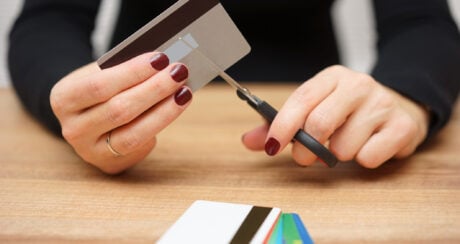Credit cards and debit cards look almost identical, but they are extremely different financial products.
- Debit cards are linked to your own money, usually an everyday or savings account. When you use a debit card to buy something, you pay for it upfront and have nothing to owe.
- Credit cards are linked to the bank’s money — a pre-approved credit limit extended to you. When you use a credit card to buy something, you’re taking on debt that you’ll need to repay within the statement period (usually a month) to avoid interest charges or fees.
Put simply, credit cards are short-term loans that must be repaid, and a debit card lets you spend your money.
Credit cards – revolving credit and debt
A credit card allows you to borrow money from the bank at a set amount based on your income, expenses, history and behaviours. This is known as a credit limit; every cardholder will have a different credit amount. If this is your first credit card, your limit will be lower, possibly $1,000 or $2,000.
That $1,000 credit limit, for example, is not cash. It’s a line of credit that you can use, pay off, use again and so on. It’s revolving, which means it stays open as long as you handle the minimum monthly repayments and any ongoing account fees.
Some people take out credit cards for big purchases, such as a holiday, a new laptop, house renovations or to start a business. As a general rule, you should only make purchases you can pay off immediately to avoid interest charges. Credit cards can offer wonderful flexibility in managing your finances as long as you use them responsibly.
» MORE: Personal loan vs. credit card: what’s the difference?
How a credit card works
- You use the credit card to make monthly transactions within your pre-approved credit limit.
- At the end of the month, you’ll receive a credit card statement listing all your transactions, the total you owe, the minimum monthly payment, the due date and the interest.
- You can pay it off in full to avoid interest (within the interest-free period) and pay the minimum monthly balance or any amount above that.
Debit cards – your cash
Think of your debit card as a way to pay for items from your everyday account or savings. If you want to use your own money (not credit) to pay for purchases in-person and online, you’ll need a debit card.
While you have to be conscious of your account’s balance before using your card, you don’t have to remember or worry about what you owe after you use your debit card.
How a debit card works
- You use the debit card to make purchases from the money in your bank account. You can only spend what you have in your account.
- There’s no amount owing and no interest, only the account fees.
- You will receive a monthly statement, but only so you can check all your transactions.
The major differences between credit and debit
You don’t have to choose between owning a credit card and a debit card. You can use both, just not for the same purchase. Like most people, you’ll reach for your credit and debit card at different times for different reasons.
Here are some details to consider with your cards.
Access to cash
You can use your debit card to withdraw your own money out of an ATM, but you can’t access cash in your bank account with a credit card. You can, however, withdraw some cash using your card through a cash advance. However, since it’s still the bank’s money, not your own, the convenience comes with higher fees and interest rates than regular credit card transactions.
But what if you need access to cash fast to pay for an unexpected expense? A credit card may come in handy, especially if you can’t cover it with money in your emergency fund. A debit card won’t help you tap into money that’s not already in your bank account.
Annual fees
Credit cards can have higher monthly or annual fees. The fee structure differs from bank to bank. For example, the CommBank Low Rate credit card charges $72 per year. Westpac’s Low Fee credit card is $0 if you spend $5,000 per year; otherwise, it’s $30. There are credit cards with no annual fees, as well.
Debit cards are seen as more of an everyday banking account feature, so you’re more likely to enjoy no fees. You might bypass fees without realising. For example, Westpac’s bank account with a debit card has a $5 account-keeping fee that’s waived if you deposit $2,000 each month. No-fee debit cards are a great way to keep more of your hard-earned money without effort. Fees add up over time and are avoidable expenses.
NAB Classic Banking and ANZ Plus accounts offer no monthly fees without minimum deposits.
Building credit
Paying your rent, bills or mortgage on time can help improve your credit score, regardless of whether you use a debit card or credit card to do so.
However, unlike debit cards, credit cards have a direct impact on your score, no matter what you’re paying for. This is because a credit card is a type of loan, and paying it back every month demonstrates your trustworthiness to lenders. By the same token, it can also hurt your credit if you fail to pay the amount due or rack up a considerable amount of debt.
» MORE: What is credit and why do you need it?
Eligibility
To get a debit card, you just need to prove your identity to the bank. In contrast, you have to apply for a credit card to prove your eligibility. Income requirements, a history of responsible credit use and more are usually necessary for most types of credit cards.
» MORE: Can you get a credit card with bad credit?
Insurances and rewards
Credit cards come with greater consumer protections and rewards programs. When you sign up for a credit card, you can access travel insurance, a reward points program (linked to airlines and travel partners), and warranties on purchases. Another huge advantage of a rewards credit card is bonus points, which can be used on flights, hotels and partner brands.
Debit cards don’t come with introductory or ongoing points — that’s exclusive to credit cards. Your bank will, however, have exclusive deals and discounts with everyday brands. When choosing bank and cards, ask about the deals that are currently available.
Liability and fraud protection
Most credit cards and debit cards in Australia have strong fraud protections, like microchips, PIN technology and CVV numbers. So, while security features vary by bank, credit and debit cards are typically equally able to protect you from fraud.
The big difference is what may happen if your card is stolen. If a thief uses your stolen debit card, they are spending your money — which you may get back, but likely only after a long wait. If a thief uses your stolen credit card, they are spending the bank’s money, so you won’t take the same financial hit.
Plus, common credit card protections, like zero liability cover, create additional guardrails.
Spending limits
Credit cards have a pre-set maximum balance, otherwise known as a credit limit. To increase or decrease it, you need to speak with your bank.
Debit cards do have a limit, but more so as security protection. For example, the Westpac Debit Mastercard has a default daily transaction limit of $8,000 for in-store, online and phone payments. A daily cash withdrawal limit of $1,000 also applies.
When to use a credit card vs debit card
Credit and debit cards can coexist in your financial lifestyle and help you manage your money. You don’t have to choose between one or the other. Each card has its place.
If you’re trying to build your credit score, you like the idea of having money on hand if you need it and you can pay off the balance before the interest kicks in, consider a credit card. With a rewards program, they can give you more than a line of credit.
But if you’re unsure whether you’ll be able to manage the repayments on time, often feel in over your head with money and would like to build your savings first, don’t rush into applying for a credit card. You can manage just fine with a debit card.
Don’t rush a decision. Your situation will change, and you can revisit it in six months. Ultimately, the end goal of money management is financial freedom. There are many ways of realising it — find the path that works for you.
Frequently asked questions
Visa debit cards are not credit cards, they are debit cards that use the Visa network — a payment processing system. Both debit cards and credit cards can use the Visa network, but the two types of cards operate differently. Debit cards are linked to your bank account and use your money to make a purchase. Credit cards, on the other hand, are a type of revolving credit. They use the issuer’s money to make a purchase, which you then pay back at the end of the month.
Mastercard is not a type of credit card, it is a payment processing network like Visa. Various types of cards, such as debit cards, credit cards and even prepaid cards, can use the Mastercard network to complete purchases. The network’s logo is typically printed on the front of the card, so you can see which network it uses.
DIVE EVEN DEEPER

How To Cancel A Credit Card The Right Way
Before you cancel a credit card, know your reason, check transactions, pay off your balance, and redeem your rewards.

Credit Card Fees: What They Are And How To Avoid Them
Credit card fees can vary among providers. Find which charges are inescapable and which ones you can avoid.

What Is a PIN (Personal Identification Number)?
A personal identification number (PIN) is a four-digit security code on a credit or debit card that authenticates the user’s identity. Using a PIN is safe, fast, and convenient.


